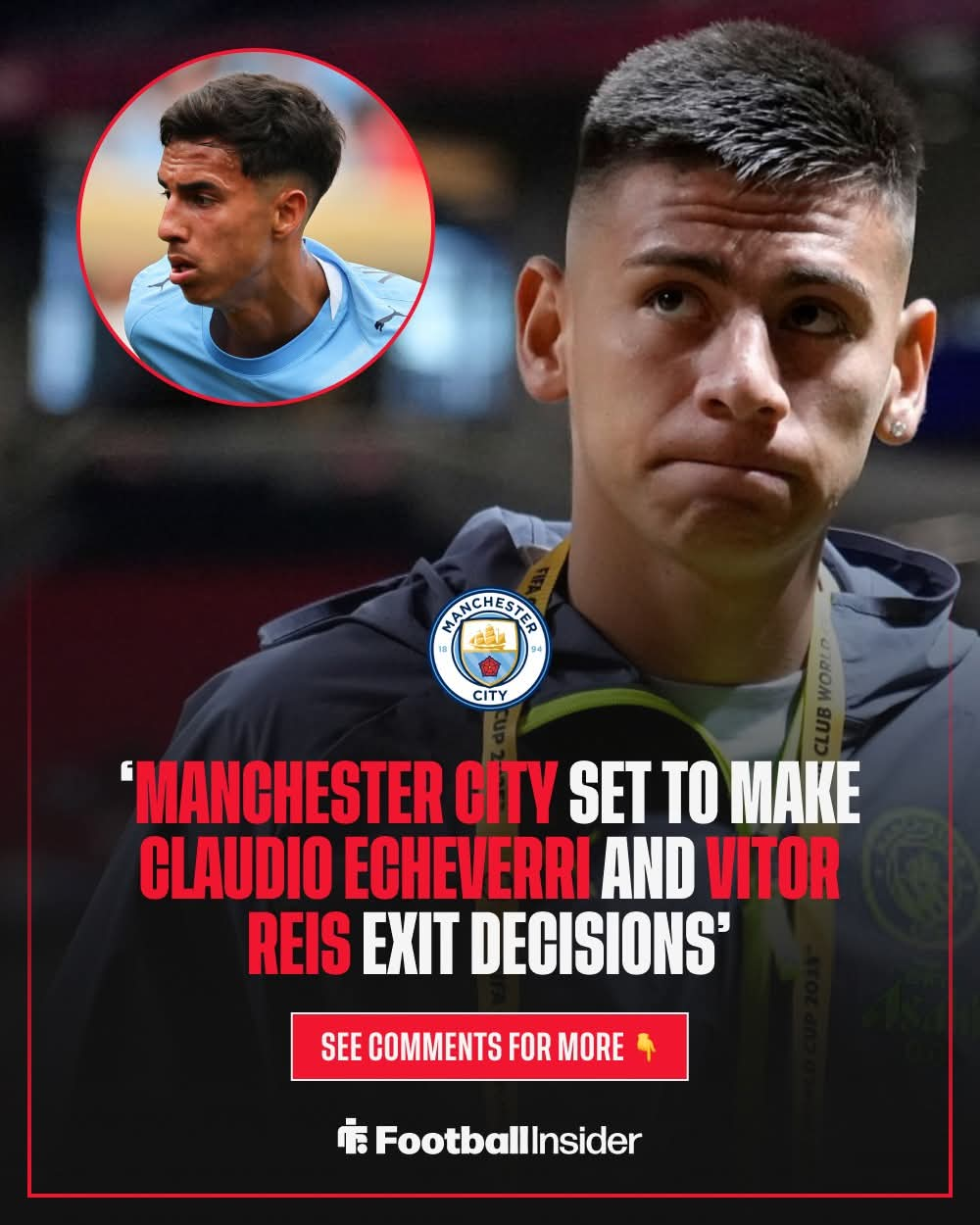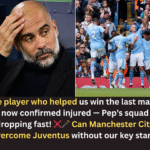Manchester City set to make Claudio Echeverri and Vitor Reis exit decisions’

The summer of 2025 presents Manchester City with a fascinating tactical and developmental conundrum as Pep Guardiola and his coaching staff deliberate over the immediate futures of two of their most promising young talents: Claudio Echeverri and Vitor Reis. Both players, aged just 19, find themselves at a pivotal juncture in their careers, having showcased glimpses of their potential during City’s Club World Cup campaign while simultaneously highlighting the challenging path that lies ahead in their quest for regular first-team football at one of Europe’s elite clubs.
Claudio Echeverri’s journey to the Etihad Stadium reads like a modern football fairy tale, albeit one still in its opening chapters. The Argentine attacking midfielder’s path from the banks of the River Plate to the blue half of Manchester represents the increasingly globalized nature of modern football recruitment. His technical prowess and creative vision caught the attention of City’s extensive scouting network, leading to a move that promised to unlock his potential under the tutelage of one of the game’s most innovative tactical minds.
The young playmaker’s shock debut in the FA Cup final against Crystal Palace served as a dramatic introduction to English football’s unforgiving spotlight. While the outcome—a defeat that denied City a domestic cup triumph—was disappointing, Echeverri’s inclusion in such a high-stakes encounter demonstrated Guardiola’s faith in the teenager’s abilities. This faith was further vindicated during the Club World Cup, where Echeverri found the back of the net in a comprehensive 6-0 victory over Al Ain, marking his first goal in City colors and providing a tantalizing glimpse of what the future might hold.
Vitor Reis presents a different but equally compelling narrative. The Brazilian defender’s transition from Palmeiras to Manchester represents the continuation of a well-established pipeline between South American football and the Premier League. Standing as a testament to the modern center-back archetype—technically proficient, comfortable in possession, and possessed of the pace and physicality required to excel in contemporary football—Reis embodies many of the qualities that have made City’s defensive unit one of the most formidable in world football.
Since his arrival from Palmeiras in January 2025, Reis has had to navigate the considerable challenge of adapting to English football while competing for opportunities in a squad already blessed with defensive riches. His four appearances for the North West outfit, while limited in number, have provided valuable insight into his readiness for the rigors of Premier League football and his potential compatibility with Guardiola’s possession-based system
Manchester City’s participation in the Club World Cup has served multiple purposes beyond the obvious objective of tournament success. For Guardiola and his coaching staff, the competition has provided an invaluable opportunity to assess the readiness of fringe players and emerging talents while managing the physical and mental demands placed upon the squad’s established stars. The tournament’s format and timing have created a unique environment where young players can demonstrate their capabilities against international opposition without the immediate pressure of domestic league competition.
The performances of both Echeverri and Reis during this tournament have been particularly noteworthy. City’s progress to the last 16, secured through two consecutive victories, has been achieved with significant contributions from both players, suggesting that their development trajectories remain firmly on course. However, the quality of opposition faced during the group stages raises important questions about the level of challenge these performances truly represent.
Echeverri’s goal against Al Ain, while undoubtedly a personal milestone, came in the context of a match that City dominated from the outset. The 6-0 scoreline serves as a stark reminder of the gulf in quality between City’s Club World Cup opponents and the caliber of teams they will face in the Premier League. This disparity highlights one of the central challenges facing young players at elite clubs: the significant step up in quality required to make the transition from promising prospect to regular first-team contributor.
The possibility of loan moves for both Echeverri and Reis represents a strategic consideration that extends far beyond simple squad management. In the modern game, where the pressure for immediate success often conflicts with long-term player development, loan arrangements have become an increasingly sophisticated tool for managing young talent. For Manchester City, with their substantial investment in youth development and global scouting networks, the loan system represents a crucial mechanism for ensuring that promising players receive the regular playing time necessary for their continued growth.
For Echeverri, a loan move could provide the consistent first-team football that has thus far eluded him at the Etihad Stadium. His three appearances for City, while valuable learning experiences, represent insufficient exposure to the demands of regular competition. The attacking midfielder’s creative instincts and technical ability suggest that he possesses the tools necessary to succeed at the highest level, but these attributes require refinement through regular match action. A carefully selected loan destination could provide the perfect environment for this development to occur.
The consideration of loan moves also reflects the pragmatic realities of squad planning at a club of Manchester City’s ambitions. With the addition of players like Rayan Cherki and Tijjani Reijnders during the current transfer window, competition for places in City’s attacking and midfield positions has intensified considerably. Cherki’s impressive performances with Lyon have already established him as a significant threat to Echeverri’s position in Guardiola’s pecking order, highlighting the relentless nature of competition at elite level football.
Vitor Reis faces a similarly complex situation, with his immediate future potentially dependent upon other transfer activities within City’s defensive structure. The club’s defensive personnel decisions during the remainder of the transfer window could significantly impact the Brazilian’s opportunities for first-team involvement. If City elect to strengthen their defensive options through additional signings, Reis may find his path to regular football even more challenging, making a loan arrangement an increasingly attractive proposition
Manchester City’s approach to managing Echeverri and Reis must be understood within the broader context of their transfer strategy and long-term planning. The club’s significant investments in young talent represent a deliberate shift toward a more sustainable model of squad development, one that combines immediate competitive success with the cultivation of future stars. This approach requires careful balancing of short-term tactical needs with long-term developmental objectives.
The signings of Cherki and Reijnders demonstrate City’s continued commitment to acquiring proven talent capable of making immediate contributions to the first team. Cherki’s experience with Lyon and his established reputation in European football make him a more immediately viable option for Guardiola’s tactical system. This reality places additional pressure on Echeverri to demonstrate his readiness for regular Premier League football or accept that his development may be best served through opportunities elsewhere.
The timing of these decisions is particularly crucial given the competitive landscape of the upcoming Premier League season. With Liverpool and Arsenal expected to provide strong challenges for the title, City cannot afford to compromise their competitive edge for developmental purposes. This reality creates a natural tension between the club’s long-term investment in youth development and their immediate competitive obligations.
Pep Guardiola’s tactical system places unique demands upon every player, regardless of their position or experience level. The intricate passing patterns, positional rotations, and defensive responsibilities that characterize City’s approach require not only technical proficiency but also sophisticated tactical understanding. For young players like Echeverri and Reis, mastering these demands represents a significant challenge that extends beyond simple technical ability.
Echeverri’s role as an attacking midfielder in Guardiola’s system requires exceptional spatial awareness, decision-making under pressure, and the ability to contribute defensively during phases of play without possession. These attributes are typically developed through extensive match experience and tactical instruction, both of which may be more readily available through a loan arrangement with a club where he would feature more regularly.
Similarly, Reis must demonstrate not only his defensive capabilities but also his comfort in City’s possession-based approach. The modern center-back in Guardiola’s system serves as both a defensive anchor and a creative catalyst, initiating attacks through precise passing and maintaining possession under pressure. These skills require consistent refinement through regular competitive action.
The psychological aspects of player development at elite clubs often receive insufficient attention in discussions of loan arrangements and squad planning. For young players like Echeverri and Reis, the pressure of competing at Manchester City can be both motivating and overwhelming. The knowledge that any mistake or subpar performance could result in extended periods without first-team opportunities creates a psychological environment that may not be conducive to the natural development process.
A loan arrangement could provide both players with the psychological space necessary for continued growth. The opportunity to be key players at their loan destinations, rather than squad players at City, could boost their confidence and accelerate their development. This psychological dimension is particularly important for creative players like Echeverri, whose best performances often emerge from a foundation of confidence and freedom of expression
The financial implications of loan arrangements extend beyond simple wage considerations. For Manchester City, ensuring that their substantial investments in young talent ultimately generate returns—whether through eventual first-team contributions or transfer fees—represents an important aspect of their overall business model. Loan arrangements can enhance player values by providing them with valuable experience and exposure, potentially making them more attractive to other clubs should permanent transfers become necessary.
The global nature of modern football also means that successful loan arrangements can enhance Manchester City’s international reputation and relationships with other clubs. Strategic partnerships developed through loan arrangements can facilitate future transfer activities and provide City with additional options for player development.
The decisions regarding Echeverri and Reis represent more than simple squad management choices; they reflect Manchester City’s broader philosophy regarding talent development and competitive strategy. The club’s ability to successfully balance the immediate demands of competing at the highest level with the long-term development of young talent will significantly impact their sustained success in the coming years.
For Echeverri, the next phase of his career could define his trajectory within the game. Whether through continued development at City or through carefully managed loan experiences, his technical abilities and creative vision suggest that he possesses the potential to become a significant contributor to elite-level football. The key lies in ensuring that his development pathway provides sufficient opportunities for growth while maintaining his connection to City’s long-term plans.
Vitor Reis faces similar challenges, with his defensive capabilities and potential compatibility with modern tactical systems suggesting a bright future ahead. The Brazilian’s adaptation to English football and his ability to meet the tactical demands of Guardiola’s system will ultimately determine whether his future lies at the Etihad Stadium or elsewhere
The cases of Claudio Echeverri and Vitor Reis highlight the complex challenges facing modern football clubs as they attempt to balance immediate competitive success with long-term development objectives. Manchester City’s approach to these decisions will provide valuable insight into their commitment to youth development and their confidence in their ability to compete at the highest level while nurturing emerging talent.
The loan option represents a pragmatic solution that could benefit all parties involved. For the players, regular first-team football could accelerate their development and enhance their long-term prospects. For Manchester City, strategic loan arrangements could protect their investments while maintaining focus on immediate competitive objectives. The success of these arrangements will ultimately depend upon careful selection of loan destinations and continued monitoring of player development.
As Manchester City prepares for another challenging Premier League campaign, the futures of Echeverri and Reis serve as a microcosm of the broader challenges facing elite clubs in the modern game. The ability to successfully manage these challenges while maintaining competitive excellence will determine not only the immediate success of these young players but also the long-term sustainability of City’s approach to squad development and talent management.
The coming weeks will reveal the specific directions chosen for both players, but their stories will continue to unfold as part of the larger narrative of Manchester City’s evolution as both a competitive force and a developer of football talent. Regardless of the immediate decisions made, both Echeverri and Reis represent the future of football—young, talented, and full of potential waiting to be unlocked through the right combination of opportunity, guidance, and determination.















